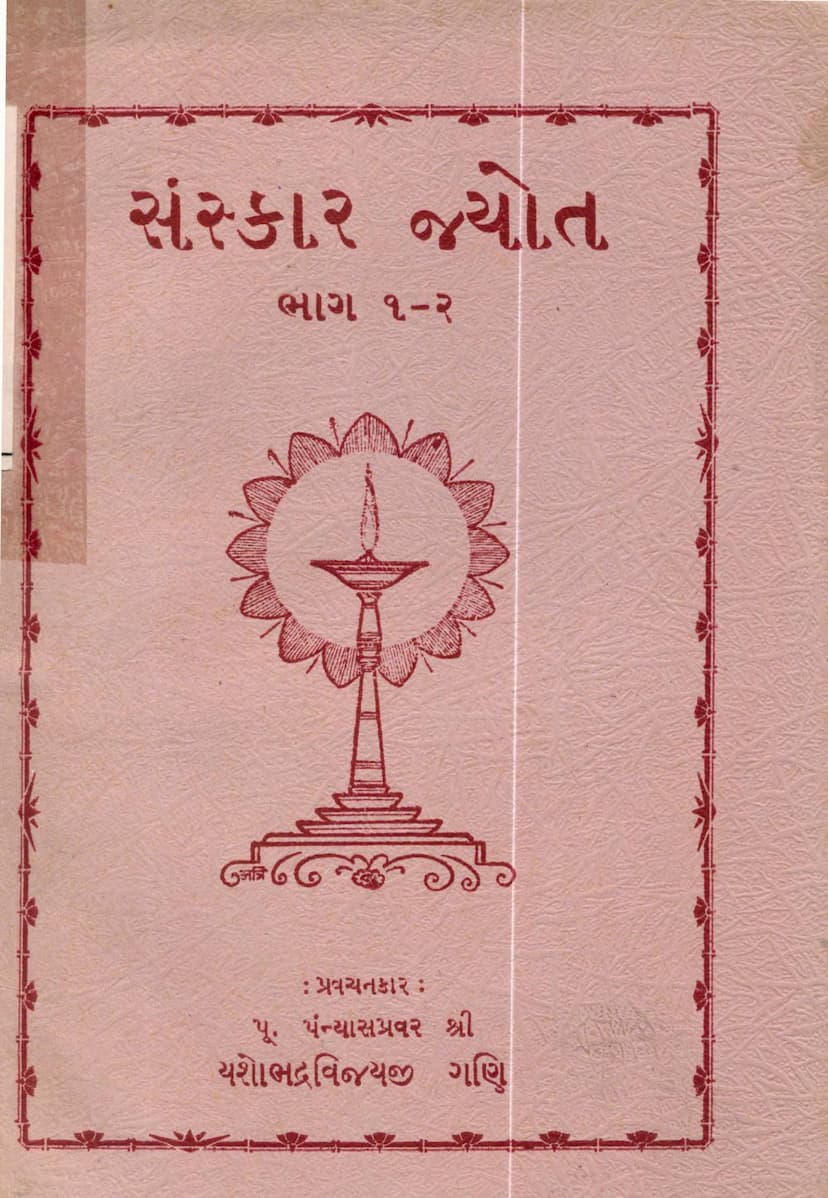Sanskar Jyot Part 01 And 02
Added to library: September 2, 2025

Summary
Here's a comprehensive summary of "Sanskar Jyot Part 01 and 02" in English, based on the provided Gujarati text:
Book Title: Sanskar Jyot Part 01 and 02 Author(s): Yashobhadravijay Gani, Bhanuchandravijay Publisher: Jashwantlal Girdharlal Catalog Link: https://jainqq.org/explore/023512/1
Overview:
"Sanskar Jyot Part 01 and 02" is a collection of spiritual discourses (pravachans) delivered by the esteemed Jain monk, Pu. Pannas Pravar Shri Yashobhadravijayji Maharaj. These discourses were meticulously recorded and compiled by Pu. Munivar Shri Bhanuchandravijay Maharaj and Shri Chimanlal Shah "Palitanakar". The book aims to illuminate the path of righteous living and spiritual upliftment for humanity, emphasizing the importance of dharma (righteousness), sanskaras (virtuous qualities and upbringing), and ethical conduct in leading a fulfilling life. The compilation is intended to spread the light of knowledge and inspire individuals to cultivate inner peace and happiness.
Key Themes and Content:
The book is a compilation of seven public discourses, each focusing on a distinct but interconnected theme crucial for spiritual and moral development. The core messages revolve around:
- The Illusion of Worldly Attachments: The discourses critically examine the various attachments and fascinations that bind individuals to the cycle of birth and death (samsara).
- The Dangers of Power and Authority (Satta no Moh): A significant portion of the book delves into the nature of the craving for power and authority, illustrating through historical and mythological examples how this attachment leads to downfall and suffering. It contrasts the pursuit of power with the virtue of selfless service.
- The Importance of Awakening (Hava To Jago): The discourses urge individuals to awaken from their spiritual slumber and recognize the ephemeral nature of worldly pleasures. They emphasize the need for self-awareness, diligence in performing duties, and the cultivation of virtues.
- The Law of Karma (Karm Tari Kala Nyari): The book provides an in-depth explanation of the concept of karma, its intricate workings, and how past actions shape present circumstances. It highlights the importance of performing righteous deeds (shubh karani) to overcome suffering and attain spiritual liberation.
- The Nature of the Worldly Existence (Sansar na Rang): The discourses describe the transient and often deceptive nature of worldly experiences, advising against being captivated by its fleeting pleasures. They encourage the development of detachment and a focus on spiritual pursuits.
- The Cultivation of Virtues and Character (Sanskar Dhan): The importance of cultivating positive sanskaras from childhood is stressed. The discourses advocate for a life guided by virtues like non-violence, truthfulness, compassion, self-control, and devotion to the divine, as the true wealth that leads to lasting happiness and spiritual progress.
- The Pursuit of Universal Welfare (Sarvodaya): The ultimate aim discussed is "Sarvodaya," which signifies the upliftment and well-being of all living beings. This is presented as achievable through spiritual realization, righteous conduct, and the practice of virtues as exemplified by Jain Tirthankaras and monks.
Style and Approach:
Pu. Yashobhadravijayji Maharaj's discourses are characterized by their:
- Simplicity and Clarity: The teachings are presented in a straightforward and accessible manner, making them relatable to people of all ages and backgrounds.
- Inspirational Tone: The discourses are imbued with a spiritual fervor that inspires listeners and readers to reflect on their lives and strive for self-improvement.
- Ethical and Moral Guidance: The book provides practical guidance on ethical conduct, moral principles, and the importance of cultivating inner qualities.
- Illustrative Examples: The teachings are enriched with historical anecdotes, mythological stories, and relatable life situations to illustrate the profound spiritual concepts effectively.
Significance:
"Sanskar Jyot" serves as a beacon of spiritual wisdom, offering timeless guidance for navigating the complexities of life and achieving true happiness and liberation. It underscores the Jain principles of ahimsa (non-violence), self-control, and detachment as the cornerstones of a meaningful existence. The book aims to foster a deeper understanding of spiritual truths and inspire readers to embrace a life of virtue and purpose.